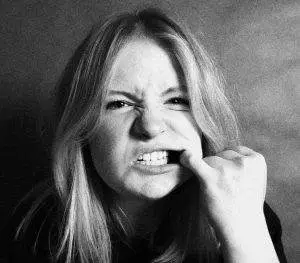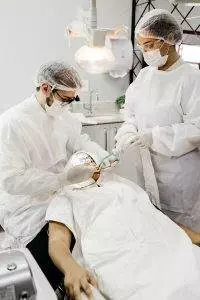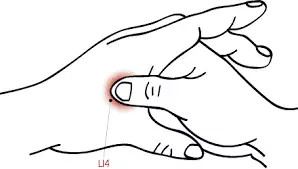By Qineng Tan, L.Ac., Ph.D. & Xiaomei Cai, L.Ac., Ph.D.

Sharp tooth pain, toothache, or throbbing pain in teeth usually means you need to see the dentist. The pain of dental work often necessitates the use of anesthetics, while post-operative pain from dental surgery is usually treated with over the counter pain medications or opioid painkillers. Acupuncture offers an alternative way of dealing with dental pain and can also relieve the dental anxiety many people experience when they have to have dental work done.
Oral pain makes it hard to eat, hard to talk, hard to even think straight. Mouth pain felt in relation to problems with the teeth, or a hurting tooth, is often nerve pain that may be sharp in one place, or radiate to other parts of your face and head. Acupuncture acts upon the neurotransmitters that carry signals between parts of the body and the brain, helping to block pain sensations and relieving tooth pain.
Different types of mouth pain, not necessarily related to dental problems or the teeth, can also be alleviated by acupuncture, including TMJ jaw pain, clicking or locking of the jaw, tension from grinding teeth, and dry mouth (xerostomia). Myofascial pain, pain in the muscles of the face, and migraines that cause pain in the neck and side of the head can also be helped with acupuncture treatment.
Acupuncture and herbs do not replace the need for regular dental visits or necessary dental procedures. However, TCM methods, used in conjunction with good oral hygiene, can help to promote the development of strong teeth in children, and the maintenance of healthy teeth and gums in adults. TCM treatments help improve immune function, as well, which can help prevent mouth infections.
While dentists have a variety of anesthetics they can use to help reduce pain during dental procedures, many people find the injection of anesthetic to be painful and anxiety-inducing in and of itself. There are definitely downsides to the pain relief offered during dental visits, so much so that many people avoid going to the dentist, or at the very least wish there was some alternative form of anesthesia. Recently, there is growing interest and research to show that acupuncture can be an effective means of providing pain relief before, during, and after dental procedures.
It is estimated that up to 30% of people report feeling dental anxiety, while about 10% of patients experience dental phobia. Acupuncture has been shown to help produce a clinically significant decrease in feelings of anxiety or fear of going to the dentist.
Managing Dental Pain

It is common to experience pain while you are waiting to get into the dentist for a toothache caused by a broken filling or because a crown has fallen out. Most dental pain is usually managed with non-steroidal inflammatory drugs (NSAIDs), also known as OTC pain medications like ibuprofen and acetaminophen. However, some people cannot tolerate the regular use of these medicines, as they can cause damage to the lining of the stomach.
Different types of anesthesia used during dental work include:
- local anesthetics (lidocaine, articaine, etc.), which numb the area where a tooth is being worked on
- sedation (nitrous oxide gas, Valium, Versed, etc.), which helps relax the patient
- general anesthesia, which means a patient is rendered unconscious for the duration of the dental procedure
Pain after oral surgery is most often treated with over the counter analgesics like ibuprofen or acetaminophen, but severe dental pain may be treated with opioid painkillers. Dentists in the U.S. are far more likely to prescribe opioid pain medications than they do in other countries. Dentists are also more likely to prescribe long-acting opioids, and to prescribe opioids for a longer period of time. The growing numbers of people addicted to opioids in America is largely due to over-prescription of these drugs. TCM methods like acupuncture can relieve a toothache and reduce post-operative pain and bleeding without side effects or risk of dependence.
Can Acupuncture Help Tooth Pain?
Acupuncture treatment has an analgesic effect, reducing pain and inflammation of all kinds. Acupuncture not only offers natural pain relief for toothache, but can also help reduce bleeding during dental procedures such as tooth extractions.
A controlled study that compared two groups of patients have teeth extracted, one group treated with articaine hydrochloride injections and the other groups treated with acupuncture needles, found that pain relief was comparable between the anesthesia and acupuncture groups, while bleeding was less amongst those patients given acupuncture.
In addition to helping with pain and bleeding during and after a dental procedure, many people find it helpful to come in and have an acupuncture treatment just prior to their dental appointment in order to help alleviate anxiety. Acupuncture may also help to reduce a person’s gag reflex, which can be easily triggered during fittings for orthodontic devices, or impressions.
With acupuncture treatment, we can also effectively treat dental anxiety, allowing for patients to feel more relaxed going into their dental appointment and feel less pain during and after a dental procedure.
Top 3 Pressure Points to Help Tooth Pain

Acupressure has been shown to help reduce anxiety, gag reflex, and the need for dental injections for pain during fittings for prosthetics. Specific points on the head and face, in particular, can help relieve toothache and swelling.
If you are experiencing acute tooth pain, plan to see your dentist as soon as possible. In the meantime, using these acupressure points for toothaches can help you stay calm and alleviate the pain until you can get treatment.
- ST6, Stomach Meridian Point 6, is located in the cheek, equidistant between the corner of the mouth and the earlobe. Apply pressure to the jaw muscle here to help relieve toothache and jaw pain.
- SI18, Small Intestine Meridian Point 18, is right in the cheek hollow, perpendicular to the corner of the eye and outside of the nose. Apply pressure to this point to help relieve tooth pain and swollen gums.
- LI4, Large Intestine Meridian Point 4, is located in the webbing between the thumb and index finger. Squeeze with firm pressure here. Often used to relieve headaches, but this point helps tooth pain, as well.
Acupuncture Near Me for Tooth Pain on the Westside of Los Angeles
No one likes going to the dentist. However, if you have a hurting tooth but you’ve been avoiding the dentist out of fear, or if you know you have to have some major work done, and you are dreading it, please consider scheduling an acupuncture appointment before your next dentist appointment. Discover for yourself how acupuncture can help relieve dental anxiety and post-procedural dental pain. You may find you feel much more relaxed about the whole thing, and herbs and acupuncture can help staunch bleeding and speed recovery after dental work.
*This article is for education from the perspective of Traditional Chinese Medicine only. The education provided by this article is not approved by FDA to diagnose, prevent, treat and cure human diseases. It should not stop you from consulting with your physician for your medical conditions. Traditional Chinese Medicine is based on Qi, which is an invisible force that usually cannot be observed by modern science. Because science focuses on testing ideas about the natural world with evidence obtained through observation, these aspects of acupuncture can’t be studied by science. Therefore acupuncture and Chinese herbs are often not supported by double-blind, randomized trials, and they are considered alternative medicine therapies in the United States.
